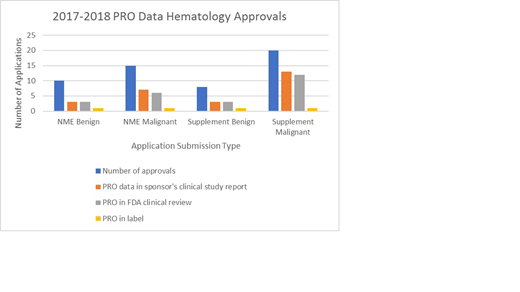Introduction: In recent years, there has been increased interest in patient experience data, including PROs. To determine how and where PRO data are being assessed and communicated as part of approval of a marketing application, we examined approvals in the Center of Drugs Evaluation and Research in the Office of Hematology and Oncology Products as well as the Center for Biologics Evaluation and Research. Here we report on PRO data from malignant and benign hematology indications.
Method: New Molecular Entity (NME) and Supplemental applications with new indications approved between 2017 and 2018 were examined. We reviewed sponsor's clinical study reports (CSRs) for inclusion of PRO data. We assessed FDA review of this data by determining how often PRO data were incorporated in the Prescribing Information (label) and/or final FDA Clinical Reviews.
Results: From 2017 to 2018 a total of 31 NMEs and 33 supplemental applications were approved for benign and malignant hematology indications (Figure 1). Of the 10 benign hematology NMEs and BLAs approved, 3 (30%) contained PRO data in the sponsor's CSR, and FDA included the PRO data in all three FDA clinical reviews with one application (Emicizumab) having PRO data incorporated in the FDA product labeling. Emicizumab's label captured disease symptoms and physical functioning, prespecified secondary endpoints in the trial.
Of the 15 malignant hematology NMEs and BLAs approved, 7 (47%) contained PRO data in the sponsor's CSR. Of the 7 submissions that contained PRO data, 6 (86%) included PRO data in the FDA clinical review and PRO data were incorporated into the label for one application. Rituxan Hycela's label captured patient preference supported by a large randomized clinical trial with preference as the primary objective.
Of the 8 supplemental indications for benign hematology, 3 (38%) of the applications contained PRO data in the sponsor's CSR and FDA included the PRO in all three FDA clinical reviews with one application (Feraheme) having PRO data incorporated in the FDA product labeling. Feraheme captured descriptive disease symptom data.
Of the 20 applications submitted for supplemental indications for hematologic malignancies, 13 (65%) contained PRO data in the sponsor's CSR. Twelve of the 13 applications that contained PRO data (92%) had this data discussed in the FDA clinical review, and one application (ibrutinib) incorporated PRO data in FDA product labeling. Ibrutinib captured descriptive disease symptom data.
Discussion: When PRO data were included in efficacy submissions to FDA, a large portion of FDA clinical reviews included discussion of this information. PRO data were included in the label more frequently for benign indications compared to malignant indications. When in the label, PRO data tended to refer to disease symptoms and physical function, both of which have been specified as being part of FDA's proposed core outcome set for cancer.
No relevant conflicts of interest to declare.
Author notes
Asterisk with author names denotes non-ASH members.


